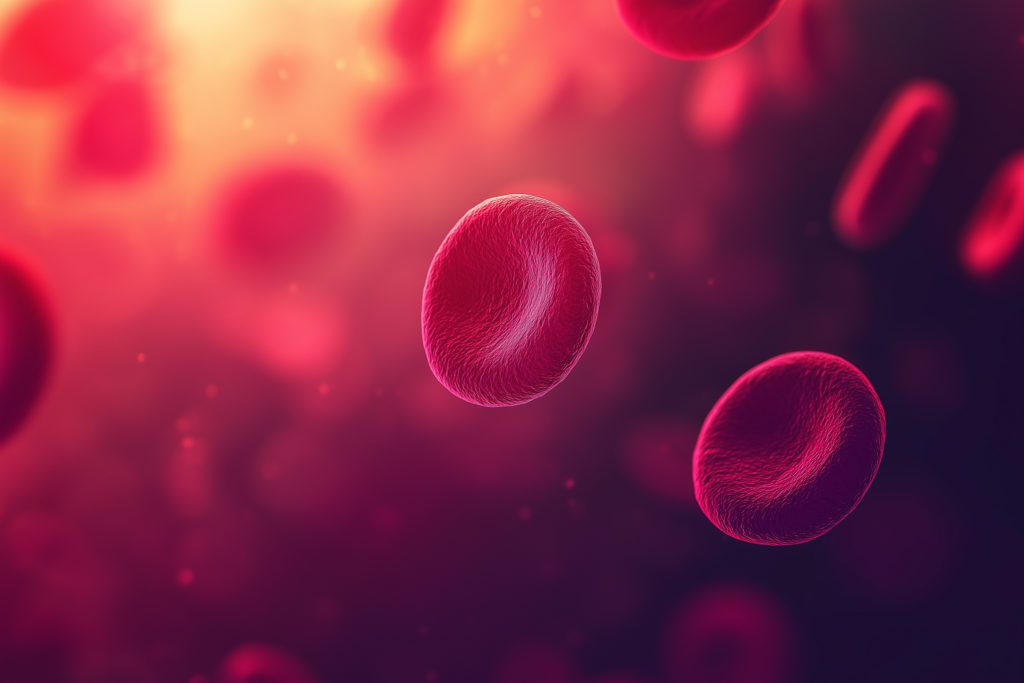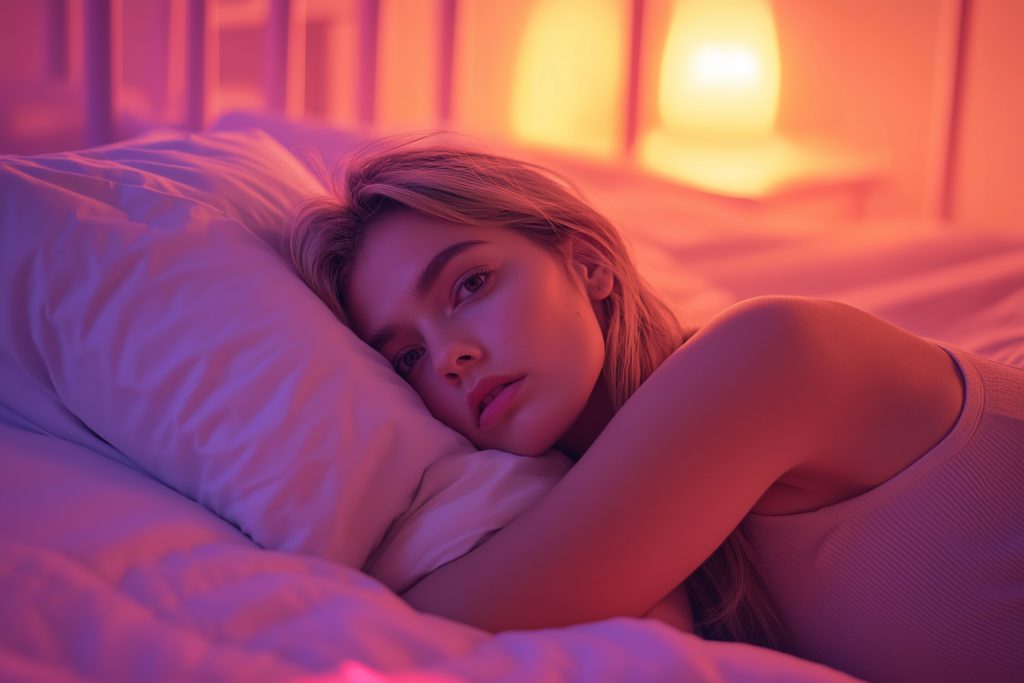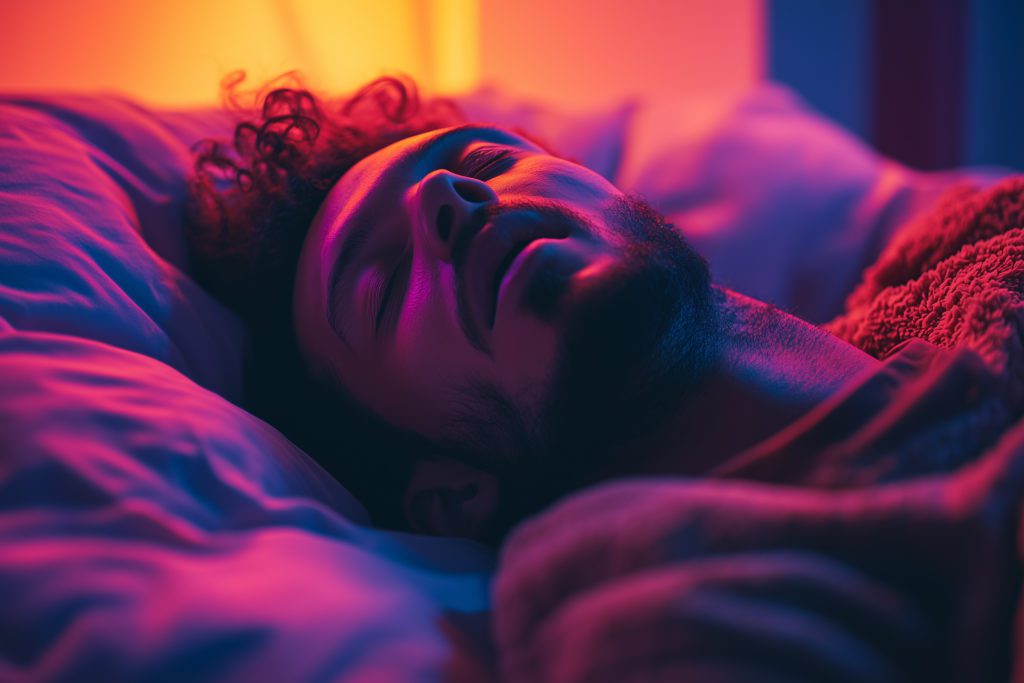
The Sleep-PMS Connection: Understanding How Hormonal Changes Impact Rest
Many women have trouble sleeping right before their menstrual cycle due to fluctuations in hormonal levels. Good sleep hygiene can improve sleep.

By now, you probably know that a good night’s rest is essential for your health. If you have trouble sleeping right before your period, premenstrual syndrome (PMS) may be to blame. Premenstrual syndrome is typically associated with moodiness, bloating, and fatigue. What many women don’t know is that insomnia and other sleep problems can also be related to PMS.
In this article, we’ll explore the connection between sleep and PMS. Plus, learn tips on what you can do to rest better.
What is Premenstrual Syndrome?
Premenstrual syndrome, or PMS, refers to a set of symptoms that typically occur during the luteal phase of the menstrual cycle or about a week before your period. PMS includes both physical and emotional symptoms. These symptoms of PMS usually go away after your period begins. But, they can make life difficult in the meantime. Approximately 80 percent of women experience PMS. Symptoms of PMS include:
- Headaches
- Cramps
- Mood swings or irritability
- Difficulty concentrating or forgetfulness
- Breast tenderness
- Muscle aches and pains
- Fatigue
- Acne
- Insomnia or sleeplessness
Some women experience premenstrual dysphoric disorder (PMDD), which is a much more severe form of PMS. It causes severe depression, extreme fatigue and mood swings. More than 60 percent of women with PMDD also have insomnia before their periods.
The Link Between PMS and Insomnia
Many studies have found that women experience worse sleep quality right before their periods. The VA Medical Center in Houston examined the sleep and emotional functioning of 51 healthy women right before their periods. Participants spent less time asleep and had significantly more night-time awakenings during the premenstrual period of their cycle compared to control subjects. Participants also reported fewer positive emotions before their period.
Another study published in Health Psychology noted that women have more frequent sleep disruptions and increased daytime sleepiness during the luteal (premenstrual) phase of their cycle.
Women who have other PMS symptoms are more likely to have trouble sleeping. The study above confirmed that the presence of other PMS symptoms is correlated with increased sleep disturbances.
What Causes PMS Insomnia?
There are likely several reasons why PMS causes insomnia. One of the reasons is because the other symptoms of PMS can make it hard to sleep. Cramps, bloating, muscle pains, and headaches can all make it nearly impossible to get a good night’s rest. Also, anxiety and depressive symptoms, which frequently occur with PMS, can lead to a poor night’s sleep. If you are depressed or worried, you’ll likely have trouble falling asleep.
One of the most significant reasons for the link between PMS and insomnia has to do with hormones. Women’s hormones, particularly progesterone and estrogen, have a significant impact on sleep quality.
When hormonal fluctuations occur during the menstrual cycle, it messes with sleep. A study published in the Journal of Sleep Medicine and Disorders found that sleep problems tend to occur during the luteal phase even if a woman doesn’t have PMS. This indicates that hormonal fluctuations that occur during a woman’s menstrual cycle impact sleep.
The hormonal changes that occur during the luteal phase affect body temperature, which impacts sleep. Your body temperature rises during the luteal phase and remains high until your period starts. Even slight changes in your body temperature can make it harder to sleep.
Hormonal changes also affect melatonin levels. Melatonin (the sleep hormone) helps regulate the body’s sleep-wake cycle. Women who experience PMDD produce less melatonin during the luteal phase. This can cause difficulty maintaining a regular sleep cycle and result in frequent awakenings.
Women who take hormonal birth control may experience fewer sleep problems. That’s because birth control prevents hormones from greatly fluctuating. However, some women may still experience some sleep problems before their period.
How to Sleep Better Before Your Period
Practicing especially good sleep habits in the days before your period starts can help you sleep better. Here are some other tips.
- Do relaxing activities before bed - Incorporate into your bedtime routine things that relieve tension, such as reading, doing bedtime yoga, or having a warm bath.
- Pay attention to your caffeine intake - Caffeine is a stimulant and can keep you awake —especially if you use it in the evening. Try giving up coffee a week before your period. If you need to be caffeinated to function, then avoid caffeine in the second half of the day.
- Consider light therapy - Light therapy, which involves daily exposure to an artificial light source, has been shown to be helpful for both PMS and PMDD. Research has found that it also helps re-align circadian rhythms, which may help improve sleep.
- Try natural sleep supplements - Natural sleep aids like valerian root and passionflower may help you sleep better.
- See a therapist - Cognitive behavioral therapy for insomnia (CBT-I) is a very effective treatment for insomnia. Besides improving your sleep, therapy can also help with other issues like mood swings and anxiety.
- Make time to exercise - Regular exercise, such as jogging, biking, or swimming, can improve sleep. Exercise may also help reduce PMS symptoms.
- Boost your mood - Reducing mood symptoms that can occur right before your period can help improve your sleep. Ideas for boosting your mood include spending time outdoors and spending time with your friends and family.
- Carefully track your sleep - Use Pillow to track your sleep so that you can see if changes in your sleep correspond to your menstrual cycle.
Don’t Let PMS Keep You Awake
The bottom line is that hormonal changes can make it hard to sleep. Insomnia and other sleep problems are more common among women who experience PMS and PMDD. The good news is that there are strategies that can help you sleep better.
If you’ve tried improving your sleep hygiene and are still tossing and turning in bed, talk to your doctor. They can do some tests and recommend appropriate treatment options. You can also request to be referred to a board-certified sleep specialist to rule out sleep disorders.
FAQ
How does PMS-related pain affect sleep?
Cramps, sore breasts, headaches, and backaches can make it hard to get comfortable at night. This discomfort can cause you to toss and turn or wake up frequently, leading to lighter, disrupted sleep and making it harder to feel well-rested the next day.
Can PMS make dreams more vivid or emotional?
Yes, hormonal changes, especially shifts in progesterone, can lead to lighter, more fragmented sleep and intense or emotional dreams. You’re also more likely to wake during REM sleep, the stage when vivid dreams occur, making you remember them more clearly.
Is there a link between PMS-related sleep issues and mood swings?
Absolutely. Poor sleep makes it harder to regulate emotions, and when it’s combined with hormonal changes, mood swings can feel more intense. You may feel more irritable, anxious, or down when you’re not getting enough restful sleep.
Do hormonal contraceptives influence sleep patterns related to PMS?
They can. Birth control pills may reduce PMS symptoms by leveling out hormonal fluctuations, which might improve sleep for some. But reactions vary—some people feel better rested, while others notice little change or even more disruption.
Are there specific lifestyle changes that can alleviate PMS-related sleep disturbances?
Yes,exercising regularly, avoiding caffeine and alcohol, sticking to a consistent bedtime, and winding down with calming routines can all improve sleep. These habits help relax your body and reduce the effects of hormone-related restlessness.
When should one seek medical advice for PMS-related sleep problems?
If PMS-related sleep issues are affecting your daily focus, mood, or well-being, it’s time to talk to a healthcare provider. They can explore treatments like supplements, therapy, or medications to help balance hormones and support better sleep.

Written by
Emily Mendez
Emily Mendez is a former therapist and mental health author. She is one of the leading voices in mental health. Emily's writing has appeared in eCounseling, SonderMind, and more. Emily is frequently interviewed by Healthline, Fatherly, INSIDER, Family Circle, and other national media for her advice and expert opinion on the latest mental health topics.
Download Pillow
Get help
Press & News
Legal
Connect
X (Twitter)
Company
Copyright © Neybox Digital Ltd.



